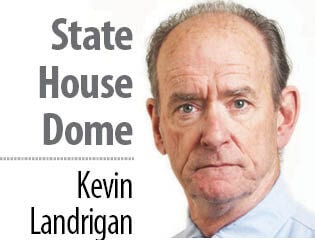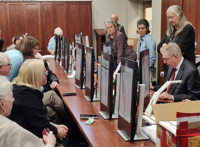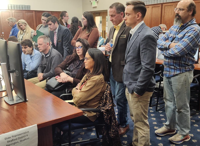CANDIDATES FOR GOVERNOR and the Legislature got a bucket of cold water tossed in their faces with the report on September state revenues that signaled the very long run of business tax revenue surpluses could be over with painful consequences.
September is the first of four big months for business tax payments, and the $185 million take was $40.9 million (18%) lower than what came in the same month last year and nearly $34 million (15.7%) less than had been forecast.
All taxes and fees last month came up $27.9 million below plan and $46 million behind the same month in 2023.
It’s looking like state budget writers will have to really sharpen their pencils to bring the next budget into balance.
A contrasting tale of two NH Dems in Congress
Anyone who followed recent action on U.S. House floor has seen the difference between a three-term incumbent (U.S. Rep. Chris Pappas, D-N.H.), running in a targeted swing seat and a six-termer (Rep. Annie Kuster, D-N.H.) who is unencumbered, preparing to ride off into the sunset and call it a Capitol Hill career.
In the past few weeks, the two have parted ways on five different bills; each of them cleared the narrowly GOP-led House, though they all likely face an uncertain future in the Democratic-led U.S. Senate.
These include the Anti-BDS Labeling Act, which would keep in place the labeling of products from the West Bank or Gaza Strip; the Violence Against Women by Illegal Aliens Act, which makes sex and domestic violence crimes grounds for deportation of unlawful U.S. residents; requiring sanctions against Chinese officials who violate the rights of people in Hong Kong, Taiwan or mainland China; and the No Foreign Election Interference Act that increased penalties for tax-exempt groups that make donations to PACS after the group has gotten funding from a foreigner.
Each time, Pappas voted with the House GOP majority to pass those bills, and Kuster voted with most House Democrats who opposed them.
For example, foes of the Middle East labeling bill said it would require shipments from illegal settlements in the West Bank be defined as “made in Israel.”
Dems group alleges GOP-Trump collusion with Jill Stein’s NH petition drive
End Citizens United, liberal campaign finance reform group, brought a complaint to the Federal Elections Commission alleging two companies with ties to the Trump campaign and national GOP forces made illegal donations to Green Party candidate Jill Stein’s campaign by helping her collect enough signatures to get her name on the Nov. 5 general election ballot.
End Citizens United maintains that if not for the petition collecting work of two GOP consulting firms, The Synapse Group of Stamford, Connecticut, and Impact Advisory Group of Washington, D.C., Stein would have come up 101 signatures short of getting the 3,000 needed for a third-party candidate to get ballot access.
Synapse was paid nearly $1 million in 2023 by America PAC, which is supporting Trump’s campaign, and IAG is led by Meaghan Cox who worked for the late U.S. Sen. John McCain and on former President George W. Bush’s campaign.
This complaint is the latest in a monthslong effort by the Democratic National Committee and supportive interest groups to legally contest the ballot efforts by third-party candidacies left of center, whether it was Robert Kennedy Jr., Stein or Cornel West.
Getting the signatures here isn’t herculean, but it’s not an automatic exercise.
Stein has gotten onto the New Hampshire general election ballot on her own twice in previous runs for president, and Libertarian Party nominee Chase Oliver is the latest in 2024 to do so from his party that’s consistently gathered enough petitions to qualify over the past three decades.
There were three others who declared an intent to run this time who came up short including anti-abortion Operation Rescue founder Randall Terry.
The complaint notes that employees of the two GOP consultant firms signed petitions to support Stein and there was as yet no evidence Stein’s presidential campaign paid either company or declared they had made an in-kind donation to her bid.
They gathered 4,720 of the 7,619 submitted on Stein’s behalf, according to the complaint.
Stein would have come up even well short of the mark in the 1st Congressional District, the complaint continues, because the state requires at least 1,500 valid names from each of the state’s two districts.
Nearly 61% of the petitions from the GOP consultants for Stein came in the 1st District, and the complaint alleges that fact is further evidence they were in collusion after it became clear Stein’s campaign couldn’t get enough signatures on her own in the eastern half of the state.
Before this gets dubbed the political scandal of the 2024 campaign, there are two cautionary notes.
First, the complaint contains no allegation that any New Hampshire GOP official, activist or Trump campaign supporter here took part in this petition drive.
Second and more importantly, Stein hasn’t received more than 2% support in any independent poll of likely New Hampshire voters.
Trump may be right when he quipped, “100% (for Stein) comes from them,” referring to Harris/Walz, but all signs point to Stein playing at best a minuscule role in the outcome here on Nov. 5.
On cash, NH Dems continue to swamp GOP
Our story this past week about the Democratic Legislative Campaign Committee’s $1 million effort to flip the State House from red to blue is only part of the massive advantage Democratic groups have over GOP ones in these final weeks.
As of two weeks ago, the House Democratic Victory Campaign Committee had raised just under $2 million in this cycle and still had $595,000 left in the bank.
The Committee to Elect House Republicans had raised $461,000 and, thanks to a much smaller burn rate, the group still had $348,000 left to spend.
The state Senate Democratic Caucus had raised nearly $976,000 and still had a $205,000 balance for the stretch run.
The Senate GOP PAC had raised $481,000 and it had only about $33,500 in surplus.
This is one reason that almost across the board, you are seeing Senate GOP incumbents raise even more than they customarily have in the past.
Sen. Kevin Avard, R-Nashua, has not been known as a prodigious fundraiser during his four terms in the Senate yet this time he’s raised more than $100,000 to fend off the challenge from Rep. Ben Ming, D-Hollis, who has outraised him by about $30,000.
The GOP also has some well-heeled special interest groups working behind the scenes on their behalf such as the fiscally conservative Americans for Prosperity, which has already raised nearly $500,000, and Make Liberty Win, a Libertarian-minded group that in the primary alone spent $155,000 backing its favored House and Senate GOP candidates.
The only place where there appeared to be mutually assured destruction lies in the race for governor. The Democratic Governors Association has already spent $1.1 million to back Democratic nominee Joyce Craig and the report says they have parked another $5 million ready to be spent if needed.
The Republican Governors Association through its Live Free or Die PAC has directed more than $2 million to GOP nominee Kelly Ayotte’s campaign.
Several GOP sources have said the RGA could spend up to four times that much to help close the deal.
Pappas, Prescott trade shots over entitlements
Last week, Pappas said his Republican primary rival, former Executive Councilor Russell Prescott of Kingston, can’t be trusted to help protect retirement savings for New Hampshire residents on two fronts.
On one, Pappas hammered Prescott’s support in the state Senate for having vote to cut retirement benefits for first responders (Group 2 public employees) in 2011 in order to make the New Hampshire Retirement System more fiscally solvent.
The Pappas campaign noted that the bill raised the retirement age, eliminated some benefits and “moved the goalposts” on who could receive others.
In the race for governor, both Ayotte and Craig have said those pension benefit cuts made it harder to recruit police and firefighters to work for the state or cities and towns.
“Russell Prescott championed the law that pulled the rug out from under hardworking New Hampshire public servants. We take Russell Prescott at his word: if sent to Congress, he will not hesitate to slash retirement benefits and rubber-stamp extremists’ plan to gut Social Security,” said Pappas Campaign Manager Kristen Morris.
During a 2022 GOP primary debate for the same seat, Prescott said when asked about Social Security that “during my time in the Senate I took tough votes upon New Hampshire’s retirement system. ... I’m willing to do that again in Washington, D.C.”
Prescott said he would not change Social Security or Medicare for seniors or those approaching retirement age, though he has said in the past that Congress needs to examine whether a new retirement plan should be offered to much younger workers.
“Washington has changed Chris Pappas, and frankly it’s disappointing,” Prescott’s campaign responded in a statement. “Chris and Russell sat side by side on the Executive Council but now like so many partisan Democrats running from their record, he pushes these cookie-cutter lies.”
“He knows Russell isn’t against Medicare and Social Security. Even the video he shared proves it. The truth is Russell Prescott supports Medicare and Social Security and will prioritize spending to make sure these important benefits are available to seniors and future generations, and saying anything to the contrary is just false.”
The Prescott campaign pointed out that when Pappas first ran for the seat, he said he was open to raising the cap on Social Security tax so that wealthier Americans pay more toward the retirement of those who earn much less.
“It doesn’t make a lot of sense a millionaire pays as much in Social Security taxes as a middle-class person,” Pappas said during an October 2018 debate with GOP nominee Eddie Edwards.
At the end of last week, the League of Conservation Voters endorsed Pappas who also released his veterans coalition that’s backing his bid for a fourth term.
Abortion still trails other top issues
The latest NHIOP-Saint Anselm poll raises the question of whether the Democratic singular focus on abortion rights can make the difference in electing Craig and more Democrats to seats in the State House.
Asked what was the most important issue facing New Hampshire, after millions being spent on television ads, abortion was a distant fourth (8%), well behind the economy (24%), border security (19%) and elections and democracy (16%).
Just as surprising perhaps, while candidates say housing is the No. 1 issue they hear about from voters, the poll had housing in seventh place (4%), tied with gun safety and behind foreign policy, taxes and the environment (all with 5% each).
Cannabis voters have their own how-to guide
Groups seeking to make New Hampshire the last state in New England to legalize recreational use of marijuana by adults want voters to be informed on the issue.
That’s why the Marijuana Policy Project has published a general guide that gives a letter grade to all candidates running for governor and state Senate.
Craig got an A from the group while Ayotte got an F.
The only Republican in the state Senate given a better grade than their Democratic rival was two-term Sen. Dan Innis, R-Bradford, who got an A- while Democratic nominee Stu Green of Andover got a B+.
The Senate has traditionally been the place where the issue has died over the past two decades.
The Senate passed a bill last spring that had the conceptual backing of Gov. Chris Sununu but the House rejected as a majority viewed it as giving the State Liquor Commission too much control over the sale of the product.
Last week, a new law (HB 1278) took effective to give anyone with a “debilitating or terminal medical condition” access to medical marijuana as long as their doctor determines the benefits would outweigh the risks.
New consulting group adds lobbyists
Cornerstone Government Affairs has added two senior lobbyists to its growing practice in New Hampshire.
Maura Weston is the founder of her own firm and worked for years with the Rath, Young and Pignatelli law firm in the fields of telecommunications, health care, energy and contract procurement.
Kristin Koch had most recently served as vice president of public policy for the Business & Industry association, and she had worked as a legislative aide in the state Senate and staffer with the New Hampshire Republican State Committee.
The pair join the unit’s founders, Marc Goldberg, former chief of staff to Sen. Maggie Hassan, and Mike Vlacich, the former regional director of the Small Business Administration who worked for former Gov. and current Sen. Jeanne Shaheen.
Homebuilders take a shot at Craig
The New Hampshire Homebuilders Association endorsed Ayotte’s bid for governor and its executive director, Matt Mayberry, said the group extended an invite to both her and rival Craig for a sit down.
“Kelly responded within the same hour, and we met with her to discuss our concerns and her ideas. Joyce Craig did not even bother to acknowledge our invitation. We need a collaborative and innovative leader like Kelly, not someone like Craig who wants to use us just in a photo op,” said Mayberry, a former GOP candidate for Congress and onetime vice chairman of the Republican State Committee.
Planned Parenthood skips 4 state Senate races
The Planned Parenthood New Hampshire Action Fund endorsed 20 Democrats running for state Senate seats but didn’t choose sides in four even though the four incumbents have opposed their issues.
The group took a pass for the seats held by Senate Majority Leader Sharon Carson, R-Londonderry; Majority Whip Regina Birdsell, R-Hampstead; Senate Finance Committee Chairman James Gray, R-Rochester; and Sen. Keith Murphy, R-Manchester.
“Every endorsed candidate has pledged to protect and expand access to the full range of reproductive health care — including safe, legal abortion — in the Granite State or has a strong record of doing so,” the group said in a statement.
Senate Democratic candidates passed over in these respective races were Kara Roy of Hudson, Michelle Moge of Derry, John Ceskavich of Strafford and retiring State Librarian Michael York of Goffstown, who won as a write-in to oppose Murphy.
Sierra Club backs more than 100 candidates
The New Hampshire Sierra Club announced its backing of 102 candidates for state office including Craig, but showed it took more than a Democratic nominee to become an “environment and climate champion.”
Only four state Senate Democrats were endorsed (Sens. Rebecca Perkins Kwoka of Portsmouth, Shannon Chandley of Amherst, Donovan Fenton of Keene and Suzanne Prentiss of Lebanon) along with six Democratic challengers.
In the Executive Council’s five districts, only Democratic challenger Emmett Soldati of Somersworth in District 1 earned the recognition.
“We congratulate the incumbents for returning to the State House after years of challenging the climate-denying ‘Sununu Path’ where every turn dismantled critical ethical governmental practices, science was ignored, energy bills and property taxes skyrocketed, and social justice languished,” Chapter Director Catherine Corkery summed up in a statement.

















